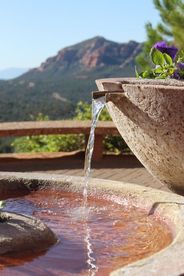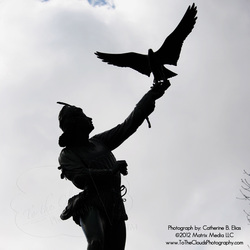Now when Jesus learned that the Pharisees had heard, ‘Jesus is making and baptizing more disciples than John’— although it was not Jesus himself but his disciples who baptized— he left Judea and started back to Galilee. But he had to go through Samaria. So he came to a Samaritan city called Sychar, near the plot of ground that Jacob had given to his son Joseph. Jacob’s well was there, and Jesus, tired out by his journey, was sitting by the well. It was about noon. A Samaritan woman came to draw water, and Jesus said to her, ‘Give me a drink’. (His disciples had gone to the city to buy food.) The Samaritan woman said to him, ‘How is it that you, a Jew, ask a drink of me, a woman of Samaria?’ (Jews do not share things in common with Samaritans.) Jesus answered her, ‘If you knew the gift of God, and who it is that is saying to you, “Give me a drink”, you would have asked him, and he would have given you living water.’ The woman said to him, ‘Sir, you have no bucket, and the well is deep. Where do you get that living water? Are you greater than our ancestor Jacob, who gave us the well, and with his sons and his flocks drank from it?’ Jesus said to her, ‘Everyone who drinks of this water will be thirsty again, but those who drink of the water that I will give them will never be thirsty. The water that I will give will become in them a spring of water gushing up to eternal life.’ The woman said to him, ‘Sir, give me this water, so that I may never be thirsty or have to keep coming here to draw water.’  If I were putting this story onto a stage, I'd concentrate on the props and the scenery I think. The well needs to be old, crafted from misshapen rocks. A sacred place that could handle heavy traffic. People coming and going, stopping and chatting. Perhaps some other large rocks around that have been warn and smoothed by many people taking a rest. A tree or two around the well, maybe a few desert brush providing some shading. And many paths clearly leading to and from the well. The woman comes from one direction. Jesus from another. His disciples take yet another away when they go to find food. And her bucket - the prop that I cannot seem to get away from. Is it a bucket made of wood? Is it a gourd? Is it a water jar crafted of clay? Is there a string on it that she brings from her home or is there a rope at the well that people use? Well water. Dependent on the land in a way that so many of us no longer understand. This woman brought her bucket. The vessel that collected her need. But after her encounter with Jesus, she left the vessel behind.  Was she giving it to Jesus to use? Had she decided to offer him a drink and instead of carrying her vessel back, she left it for Jesus to use? But he doesn't need water. He serves up life giving, everlasting thirst quenching "water." And the disciples have arrived, interrupting the moment that Jesus was having with the woman. Jesus isn't hungry either. He has "food" no one knows about. Maybe it is the disciples who need the vessel? What is this vessel? What does it represent? It is her proverbial shopping bag. I carry bags filled with bags every time I go to the grocery store. Does her vessel represent the things that sustain our lives? Is it money? independence? career? vocation? hobby? relationship? What are the vessels that aid in our existence, that keep us alive? What happens when those things are no longer needed? How is it possible to encounter Jesus in such a way that our vessels are no longer needed?
0 Comments
Leave a Reply. |
Search this blog for a specific text or story:
I am grateful for
|

This work is licensed under a Creative Commons Attribution-NonCommercial-ShareAlike 3.0 Unported License.
